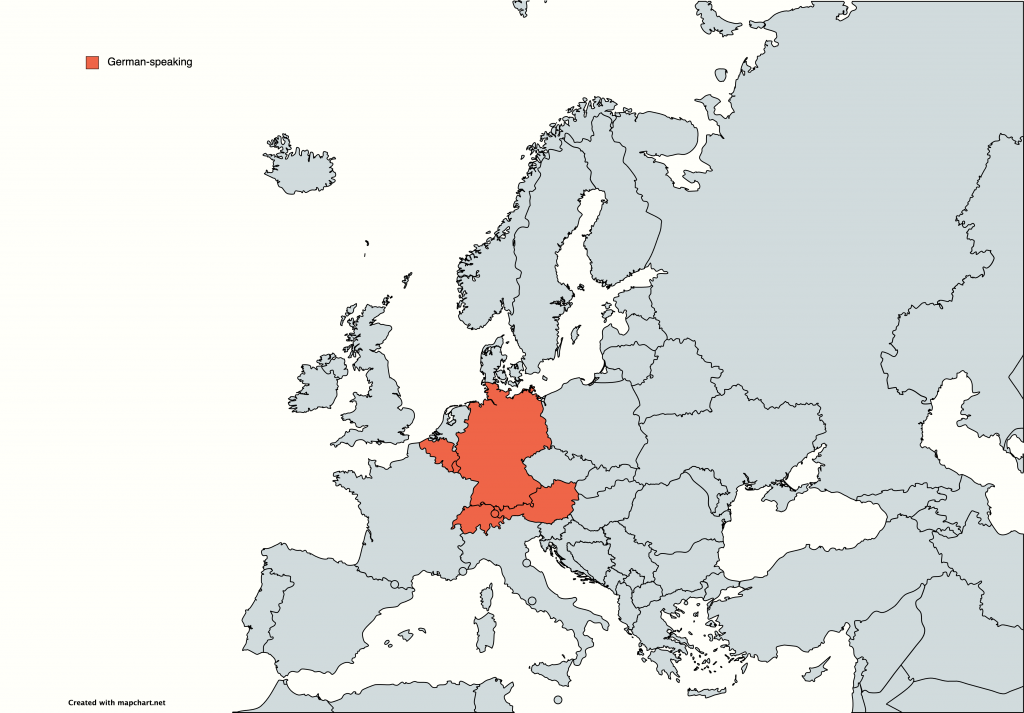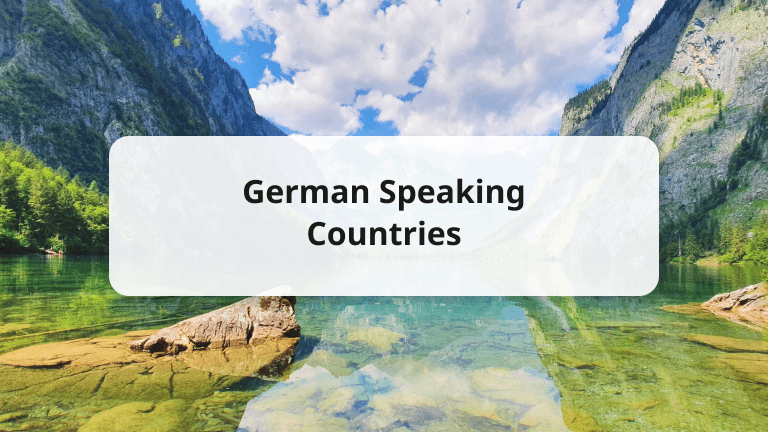How many German speaking countries are there? How many people speak German?
With close to 100 million native speakers in Europe, German is the most spoken language on the continent (after Russian, with 110 million). The six countries that have German as their official language, in alphabetical order, are Austria, Belgium, Germany, Liechtenstein, Luxembourg, and Switzerland. Over 78% of the world’s German speakers live in Germany. Over 8% live in Austria, more than 5% reside in Switzerland, less than 1% live in Italy, and more than 7% live in other countries.
German-Speaking Countries and Territories

| Country/Territory | Flag | Number of Speakers | Legal Status |
|---|---|---|---|
| Germany | 🇩🇪 | 78 million | Official |
| Austria | 🇦🇹 | 8 million | Official |
| Switzerland | 🇨🇭 | 5 million | Co-official |
| Liechtenstein | 🇱🇮 | 37,000 | Official |
| Belgium | 🇧🇪 | 1.5 million | Official |
| Luxembourg | 🇱🇺 | 600,000 | Official |
As the table shows, Germany has the highest number of German speakers with over 78 million people. Austria, Switzerland, Liechtenstein, Belgium and Luxembourg also have a significant number of speakers, with 8 million, 5 million, 37,000, 1.5 million and 600,000 respectively.
The question of how many countries speak German depends on whether we count countries where German is official at a national level, at a local level, or countries where German is spoken by immigrant communities.
German in Different Areas
German is a Germanic language, which means it is a member of the Indo-European language family and is closely related to other Germanic languages such as English, Dutch, Swedish and Norwegian. It is also influenced by Romance languages, such as French and Italian, and Semitic languages, such as Hebrew and Arabic. German is the official language of Germany and Austria, and one of the official languages of Switzerland, where it is spoken by the majority of the population. It is also spoken by a large percentage of the population in Liechtenstein and Luxembourg and is an official language in Belgium.
German is not only spoken in Europe but it is also spoken in countries outside of Europe. German is a minority language in countries such as Brazil, Argentina, and Chile, where it is spoken by people of German descent. Additionally, German is a widely taught foreign language in schools in many countries around the world.

Unique Features of German in Different German-Speaking Countries
The German language can vary greatly between different German-speaking countries and territories.
Standard German
- Vocabulary: Standard German has a rich vocabulary, and it is the version of German used in official settings, such as government and media.
- Pronunciation: Standard German has a relatively consistent pronunciation across the country. The “ch” sound is pronounced as “k” in standard German.
- Grammar: Standard German has a complex grammatical structure, for example, it has a large number of cases, and the subjunctive mood is used frequently.
Austrian German
- Vocabulary: Austrian German has a distinctive vocabulary, it has many words that are not commonly used in standard German. For example, the word “Sackerl” (small bag) is commonly used in Austria but not in Germany.
- Pronunciation: Austrian German has a unique pronunciation, for example, the “ch” sound is pronounced as “sh” in Austrian German and the word “ich” (I) is pronounced as “i”.
- Grammar: Austrian German has a simplified grammatical structure compared to standard German, for example, it uses fewer cases, and the subjunctive mood is less common.
Swiss German
- Vocabulary: Swiss German has a lot of words that are not found in standard German. For example, the word “velo” (bike) is used in Switzerland, but it is not commonly used in Germany.
- Pronunciation: The pronunciation of Swiss German is quite different from standard German. For example, the “ch” sound in standard German is pronounced as “sh” in Swiss German. Additionally, the “s” sound is pronounced as “z” at the end of words.
- Grammar: Swiss German has a simpler grammatical structure than standard German, for example, the use of the subjunctive mood is less common.
- Dialects: Swiss German is spoken in many different dialects, each with its own distinct features. For example, the dialect spoken in Zurich is different from the dialect spoken in Bern.

FAQs
The 6 main German-speaking countries are Germany, Austria, Switzerland, Liechtenstein, Luxembourg and Belgium.
German is also spoken in countries such as Brazil, Argentina, and Chile by people of German descent. Additionally, German is a widely taught foreign language in schools in many countries around the world.
Unlock the Secrets of German-Speaking Countries
The German language is spoken in a variety of countries and territories around the world, each with its unique features and dialects. Whether you’re planning to visit Germany, Austria, or Switzerland, or you’re simply interested in learning a new language, AmazingTalker can help. Our online tutors are native German speakers who can help you improve your German skills and reach your language learning goals. Also, unlock your language potential with AmazingTalker’s Language Q & A Platform now!
Read More:
German Pronunciation Guide for Beginners: Alphabet & Practice
5 Ways to Say Cheers in German | Be Ready for Oktoberfest
Thank You in German & How to Respond for the Etiquette

















